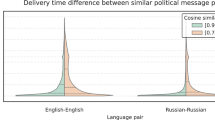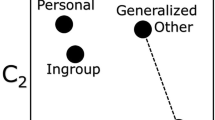Abstract
THE concept of tendermindedness has been at the centre of a controversy ever since Eysenck1 attempted to relate it to political attitudes. First Christie2 then Hanley and Rokeach3 sought to discredit the ideas put forward by Eysenck. To some extent the issue has been difficult to settle because there has been no external criterion against which T could be validated. Until now it has been open to whatever interpretation the various parties have cared to place on it. Nor has the scale at present used by Eysenck to measure T ever been factor analysed.
This is a preview of subscription content, access via your institution
Access options
Subscribe to this journal
Receive 51 print issues and online access
$199.00 per year
only $3.90 per issue
Buy this article
- Purchase on SpringerLink
- Instant access to the full article PDF.
USD 39.95
Prices may be subject to local taxes which are calculated during checkout
Similar content being viewed by others
References
Eysenck, H. J., The Psychology of Politics (Routledge, Kegan Paul, London, 1954).
Christie, R., Amer. J. Psychol., 68, 702 (1955); Psychol. Bull., 53, 411, 439 (1956).
Rokeach, M., and Hanley, C., Psychol. Bull., 53, 169 (1956).
Melvin, D., Ph.D. thesis, Univ. of London (1955).
Eysenck, H. J., J. Soc. Psychol., 53, 243 (1961).
Author information
Authors and Affiliations
Rights and permissions
About this article
Cite this article
GREEN, R., STACEY, B. The T Concept. Nature 196, 94 (1962). https://doi.org/10.1038/196094a0
Issue date:
DOI: https://doi.org/10.1038/196094a0



